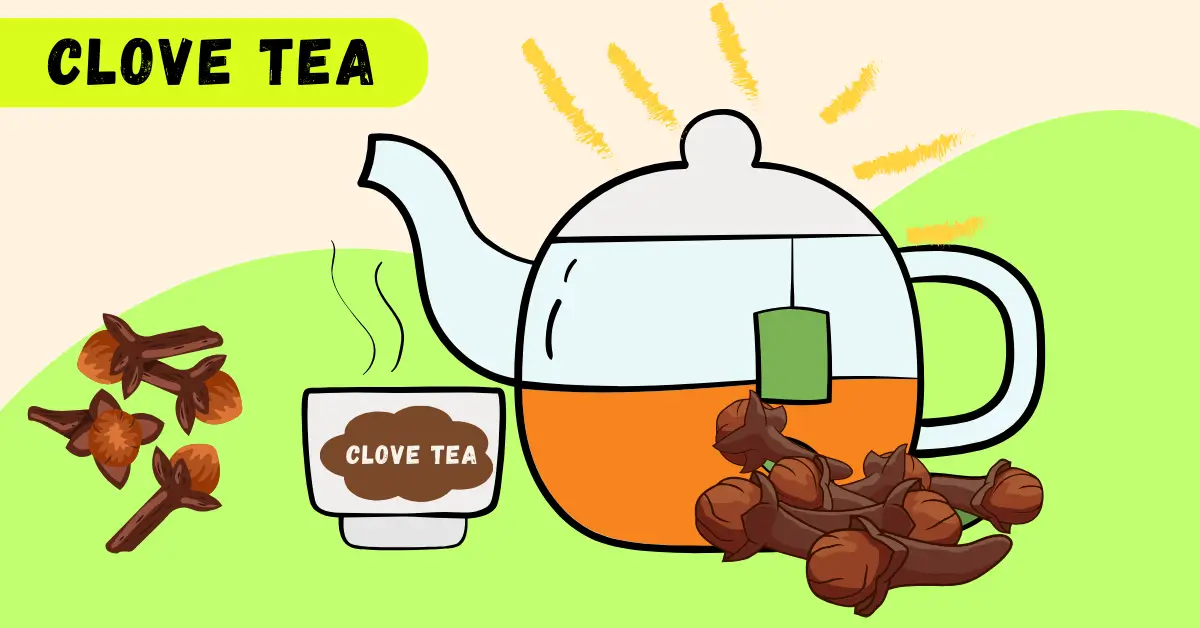Learn how to make clove tea at home with 3 easy recipes for cough relief, better digestion, and stronger immunity. Discover clove water benefits, dosage, side effects, and why this ancient spice is a modern-day health remedy.
Thank you for reading this post, don't forget to subscribe!Why Clove Tea Deserves a Spot in Your Routine
Cloves are more than spice cabinet staples—they are valued globally for their healing abilities. This section explores their importance in traditional medicine, focusing on pain relief, infection fighting, and vitality enhancement.
Today, clove tea is making a comeback as people look for natural, inexpensive ways to support immunity, improve digestion, and soothe everyday ailments like coughs and inflammation.
To better understand what makes clove tea so valuable, we’ll explore:
- Science-backed clove tea benefits.
- Three easy clove tea recipes for cough, digestion, and immunity.
- The right dosage and possible side effects.
Clove Water – A Traditional Healing Drink
Clove water highlights the simplest way to access clove’s medicinal qualities. In this section, learn how soaking cloves in water was traditionally used to address sore throats, stomach upset, and fatigue due to its beneficial properties.
Advantages of Drinking Clove Water
- Aids Digestion: Helps reduce bloating, nausea, and indigestion.
- Boosts Metabolism: Drinking it on an empty stomach may support weight management.
- Relieves Throat Irritation: Soothes sore throats and mild coughs.
- Hydrates with Benefits: Unlike plain water, it delivers antioxidants and natural oils.
Concluding the clove water section, this part sets up how heated infusions like clove tea expand on these basic benefits, leading into the next topic.
Why Clove Tea Is Gaining Popularity
Amid rising interest in herbal teas and wellness, clove tea is a powerhouse. It’s caffeine-free, affordable, and provides multiple benefits in one cup. If you want to ease coughs, improve digestion, or strengthen immunity during flu season, clove tea is a comforting and practical choice.
Clove Tea Benefits (Quick Guide)
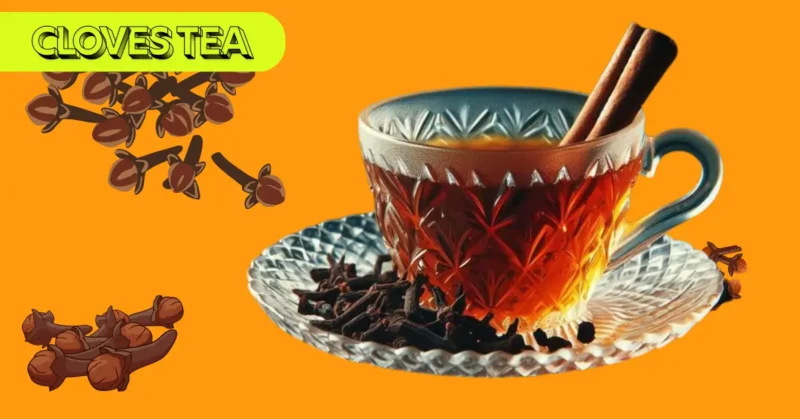
This section highlights the primary benefits of clove tea in a clear, concise manner.
- For Inflammation: Cloves are rich in eugenol, a natural anti-inflammatory compound. Drinking clove tea may help reduce inflammation in the body, easing discomfort from arthritis, sore muscles, or chronic pain.
- For Weight Loss: Clove tea boosts metabolism and may help burn fat more efficiently. Combined with a balanced diet, it reduces sugar cravings and supports healthy weight management.
- For Sleep: The soothing properties of clove tea, especially when blended with cinnamon, can relax the body and mind. A warm cup before bed may help improve sleep quality.
- For Toothache: Cloves have been used for centuries in dental care. Clove tea may temporarily relieve tooth pain and freshen breath, thanks to its antibacterial and numbing effects.
- For Cough: Warm clove tea works as a natural expectorant, helping loosen mucus and soothe throat irritation. It’s an age-old home remedy for seasonal coughs.
- For Respiratory Relief: Clove’s antimicrobial properties help fight respiratory infections. Drinking clove tea may ease congestion and improve breathing.
- For Pain Relief: From headaches to menstrual cramps, clove tea offers natural analgesic effects. Eugenol reduces pain signals, making it a gentle alternative to over-the-counter painkillers.
- Cardiovascular Health: Clove tea may help lower cholesterol and improve circulation. Its antioxidant compounds support heart health and reduce oxidative stress.
- Immune Support: Packed with antioxidants and antibacterial properties, clove tea strengthens the immune system and helps the body fight infections naturally.
- Oral Health: Clove tea’s antimicrobial action fights bacteria in the mouth, supporting fresher breath and healthier gums.
- Digestive Health: By stimulating digestive enzymes, clove tea reduces bloating, indigestion, and nausea. It’s a gentle aid for smoother digestion.
- May Help Regulate Blood Sugar: Studies suggest that clove compounds can help manage blood sugar levels, making clove tea beneficial for those with insulin resistance.
- Supports Bone Health: Cloves contain manganese, calcium, and other minerals that support strong bones. Regular consumption may help reduce the risk of bone loss with age.
- Potential Anti-Cancer Properties: Some research indicates that clove’s antioxidants, especially eugenol, may help fight free radicals and reduce cancer cell growth in laboratory studies.
Clove Tea Benefits Explained Through Recipes
How to Make Clove Tea at Home for Beginners
Let’s see how these benefits come alive through easy-to-follow recipes for making clove tea at home, even for beginners.
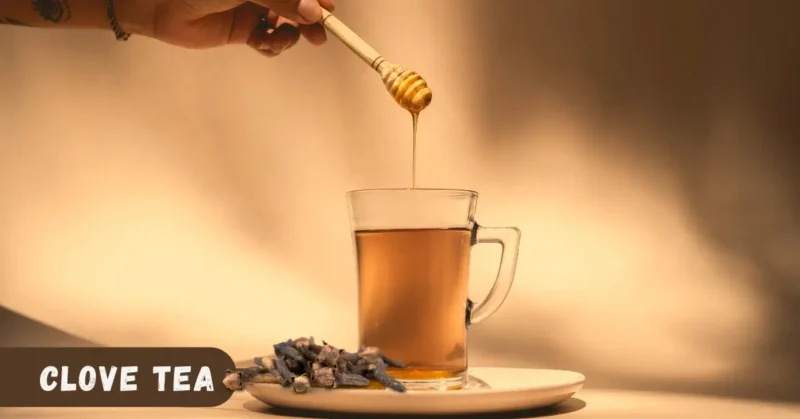
If you’re new to herbal teas, start with this clove tea. It uses just two ingredients—cloves and water—with optional honey. The preparation is quick, and the flavor is bold: spicy, warm, and comforting.
Recipe:
Ingredients:
- 1 cup water
- 3–4 whole cloves
- Honey (optional)
Instructions:
- Bring one cup of water to a boil in a kettle or saucepan.
- Add the cloves to the boiling water and let them simmer on low heat for about 5 minutes.
- After simmering, strain the tea into a cup to remove the cloves.
- Stir in a teaspoon of honey if desired. Sip the tea while it’s still warm.
Why it Works:
This simple infusion captures the essential oils in cloves, especially eugenol, which gives them both their aroma and healing power.
Benefits Highlighted:
- Relieves cough and sore throat: The warmth soothes irritation, while clove’s antimicrobial properties help fight minor infections.
- Soothes toothache and oral pain: The natural numbing effect of cloves can ease gum pain and tooth sensitivity.
- Reduces inflammation and joint discomfort: Eugenol has anti-inflammatory action, which may calm swelling in joints and muscles.
- Provides gentle pain relief: Whether it’s a headache or mild body ache, this tea offers natural comfort without side effects.
Ginger, Cinnamon, and Clove Tea – Hot or Cold
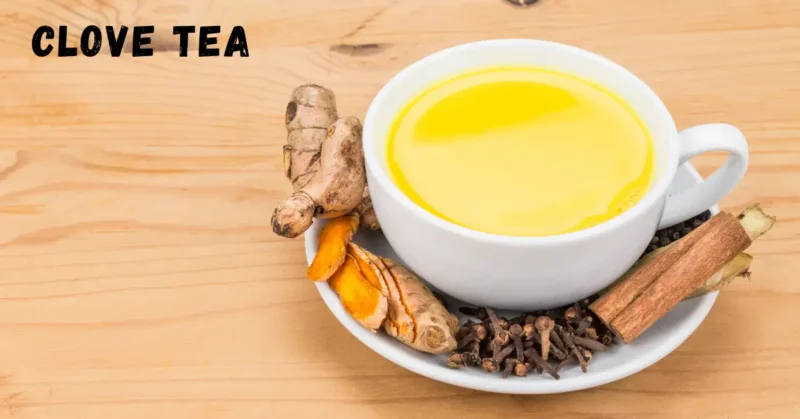
If you want something more flavorful and energizing, this recipe combines three powerful spices: ginger, cinnamon, and cloves. Together, they create a rich, aromatic tea that can be enjoyed hot on chilly evenings or iced during summer for a refreshing twist.
Recipe:
Ingredients:
- 1 cup water
- 3 cloves
- ½ tsp freshly grated ginger
- 1 small cinnamon stick
- Honey or lemon to taste
Instructions:
- Place all ingredients, except honey or lemon, into a pot of boiling water.
- Simmer the mixture uncovered for 7–8 minutes so the spices fully release their oils.
- Strain the tea into a cup to remove the spices.
- Add honey for sweetness or lemon for brightness, according to your preference.
- Serve hot for comfort, or cool and pour over ice for a refreshing drink.
Why it Works:
This blend doesn’t just taste great—it’s healing. Ginger aids digestion, cinnamon supports blood sugar, and cloves fight inflammation. Together, they offer both energy and relaxation.
Benefits Highlighted:
- Boosts metabolism for weight loss: The warming spices increase thermogenesis, helping the body burn calories more effectively.
- Improves digestion and eases bloating: Ginger and cloves relax the gut muscles and reduce gas.
- Helps regulate blood sugar levels: Cinnamon and cloves both have compounds that support healthy glucose balance.
- Supports better sleep when taken warm at night: The gentle spice blend promotes relaxation.
- Promotes cardiovascular health: Antioxidants in all three spices improve circulation and reduce oxidative stress on the heart.
Clove Ginger Tea: The Ultimate Immune-Boosting Winter Beverage Guide
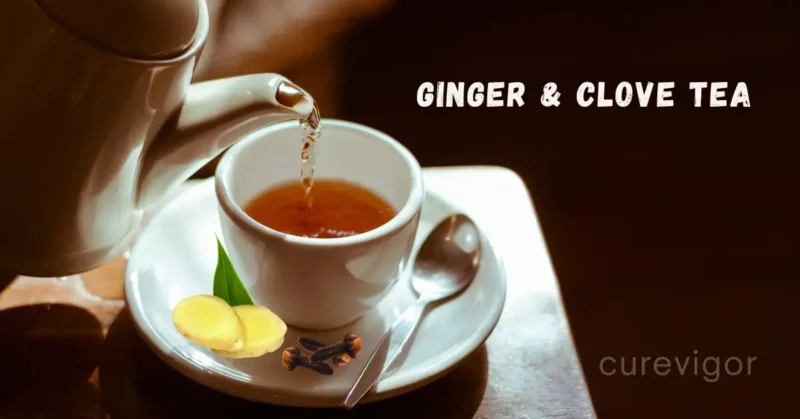
When cold and flu season hits, this tea is a natural line of defense. Ginger adds warmth and circulation-boosting qualities, while lemon provides vitamin C and a refreshing brightness. Combined with cloves, this tea is not only healing but also delicious.
Recipe:
Ingredients:
- 1 cup water
- 3 cloves
- 1 tsp fresh ginger (sliced or grated)
- ½ tsp lemon juice
- Honey (optional)
Instructions:
- Bring water to a boil. Add cloves and ginger to the boiling water.
- Reduce the heat and let it simmer for 6–7 minutes until you smell the aroma.
- Strain the tea into a cup, then stir in the lemon juice.
If desired, add honey to the tea for added sweetness and throat soothing.
Why it Works:
This recipe blends the warming qualities of ginger with the antimicrobial strength of cloves. Lemon not only enhances the flavor but also boosts vitamin C, making it a powerful immunity tonic.
Benefits Highlighted:
- Strengthens immunity against seasonal infections: The antioxidants in cloves and ginger help fight viruses and bacteria.
- Supports bone health: Cloves contain manganese and calcium, which are necessary for strong bones.
- Offers potential anti-cancer benefits: Studies suggest eugenol in cloves may slow the growth of harmful cells.
- Provides cold relief and clears congestion: The spicy steam and warmth loosen mucus and ease breathing.
Clove Tea Recipe Spotlight: Ancient Remedy for Cold Relief & Better Digestion
For centuries, clove tea has been passed down as a trusted home remedy in households across Asia, Africa, and the Middle East. Before pharmacies and syrups became common, families would turn to their spice jars for healing, and cloves almost always made an appearance.
This aromatic spice, when simmered in hot water with ginger and a touch of honey, transforms into more than just a warm drink—it becomes a natural tonic for resilience and comfort.
What makes this recipe “ancient” isn’t only its age but its simplicity. Did you know what is the importance of cloves in history? Cloves were known to seafarers and traders as far back as 2000 years ago, valued not just for flavor but for their ability to fight infections during long voyages.
When combined with ginger, another root famous for calming the stomach, the result is a tea that soothes the throat, clears congestion, and gently stimulates digestion. A spoonful of honey rounds it off with natural sweetness and adds antibacterial power of its own.
How It Helps:
- Cold Relief: The steam from clove tea opens up nasal passages, while its antimicrobial oils fight the germs that cause sore throats and coughs.
- Better Digestion: Ginger and cloves work together to ease bloating, indigestion, and nausea, making this tea ideal after heavy meals.
- Overall Vitality: Taken regularly, this simple infusion supports immunity, reduces fatigue, and promotes a sense of warmth and energy during colder months.
In many families, sipping this tea wasn’t just about treating symptoms—it was part of seasonal wellness. On rainy days or winter evenings, parents would prepare it as both prevention and cure, ensuring everyone in the household felt nurtured and protected.
Even today, health enthusiasts and natural remedy seekers continue to embrace this recipe as proof that sometimes, the simplest traditions carry the deepest healing.
Dosage and Consumption
Like most herbal remedies, clove tea is most effective when enjoyed in moderation. Drinking a small amount daily can bring health benefits without overwhelming the body with too many active compounds.
- Safe Limit: Most experts recommend 1–2 cups per day. This amount is enough to soothe digestion, support immunity, and provide relief from common ailments, while avoiding the risks that come with excessive use.
- Best Time to Drink:
- After meals – A cup of clove tea can help with digestion, reduce bloating, and ease discomfort after eating.
- Before bedtime – Taken warm, it may promote relaxation and relieve nighttime cough, making it easier to fall asleep.
- After meals – A cup of clove tea can help with digestion, reduce bloating, and ease discomfort after eating.
- Who Should Avoid or Limit: While clove tea is safe for most people, certain groups should exercise caution. Pregnant or breastfeeding women are advised to consult their healthcare provider first, as strong herbal teas may not always be suitable. Young children may be more sensitive to its strong oils. Additionally, individuals taking blood-thinning medications, diabetes treatments, or anticoagulants should be cautious, since clove compounds can interact with these medicines.
- The key is balance—clove tea can be a wonderful daily ritual, but it should complement, not replace, professional medical guidance.
Clove Tea Side Effects
This section addresses possible clove tea side effects, so readers understand risks and how to enjoy this drink safely.
- Stomach irritation or heartburn: The strong oils in cloves, especially eugenol, may irritate the stomach lining when consumed in large amounts. If you’re prone to acid reflux, it’s best to drink clove tea after food rather than on an empty stomach.
- Allergic reactions: Although rare, some people may develop skin rashes, itching, or breathing difficulties after consuming cloves. If you notice any unusual reaction, discontinue use immediately.
- Blood sugar fluctuations: Cloves may naturally lower blood sugar. For people taking diabetes medications, combining the two could cause blood sugar to drop too low. Monitoring levels and consulting a doctor are essential.
- Increased bleeding risk: Eugenol in cloves can slow blood clotting. Drinking too much clove tea, especially if combined with anticoagulant medications or before surgery, could increase the risk of bleeding.
In essence, clove tea is safe for everyday wellness when enjoyed in moderation. Being aware of your body’s responses and consulting a healthcare provider if you’re on medication ensures you can enjoy its healing benefits without worry.
The Bottom Line
Clove tea is not just another herbal drink—it is a timeless remedy that has stood the test of centuries. Rooted in traditional medicine and now supported by modern research, this simple infusion offers a wide range of benefits packed into a single cup.
From easing coughs, soothing sore throats, and calming inflammation, to improving digestion, regulating blood sugar, and strengthening the immune system, clove tea proves to be both comforting and functional.
The recipes we explored—from the basic beginner’s version to the spiced blends with ginger, cinnamon, and lemon—show that clove tea can be tailored to your needs, whether you want relief from a cold, better digestion, or a daily immunity boost.
With the correct dosage and mindful consumption, it can become a safe, healing ritual in your wellness routine.
In essence, clove tea is more than a beverage—it’s a natural companion for better health. By incorporating one of these recipes into your day, you’re not only enjoying a flavorful drink but also tapping into centuries of wisdom that continue to support vitality and well-being.
Read more healthy tips.
You might like:

